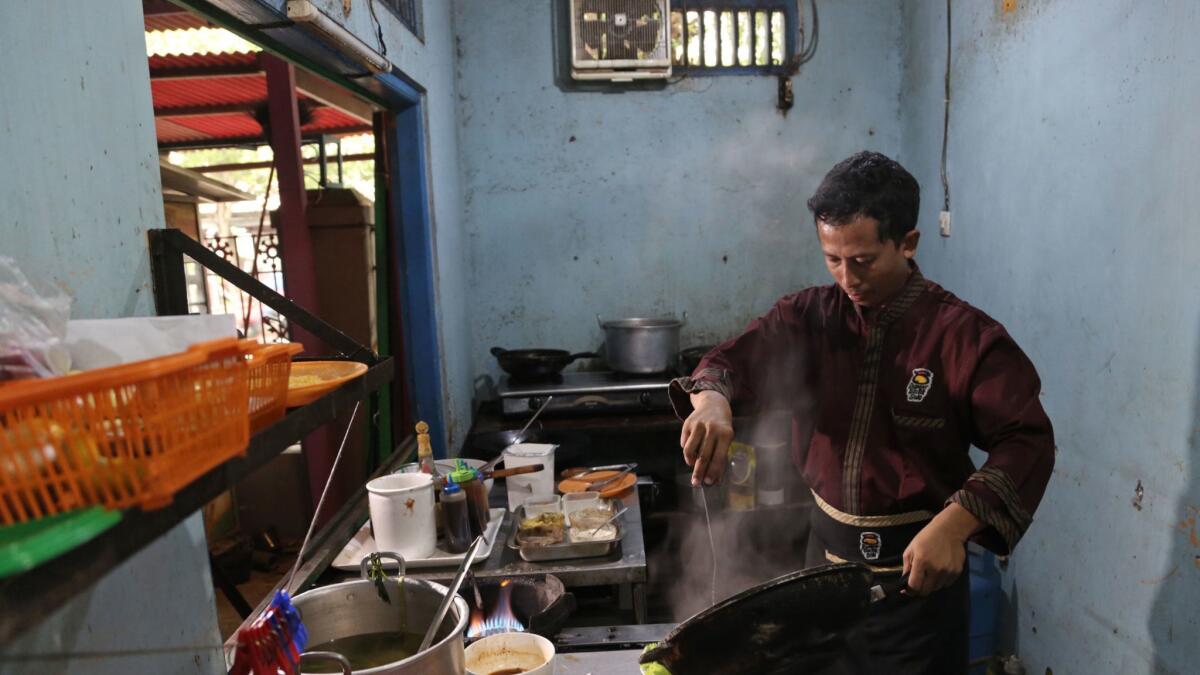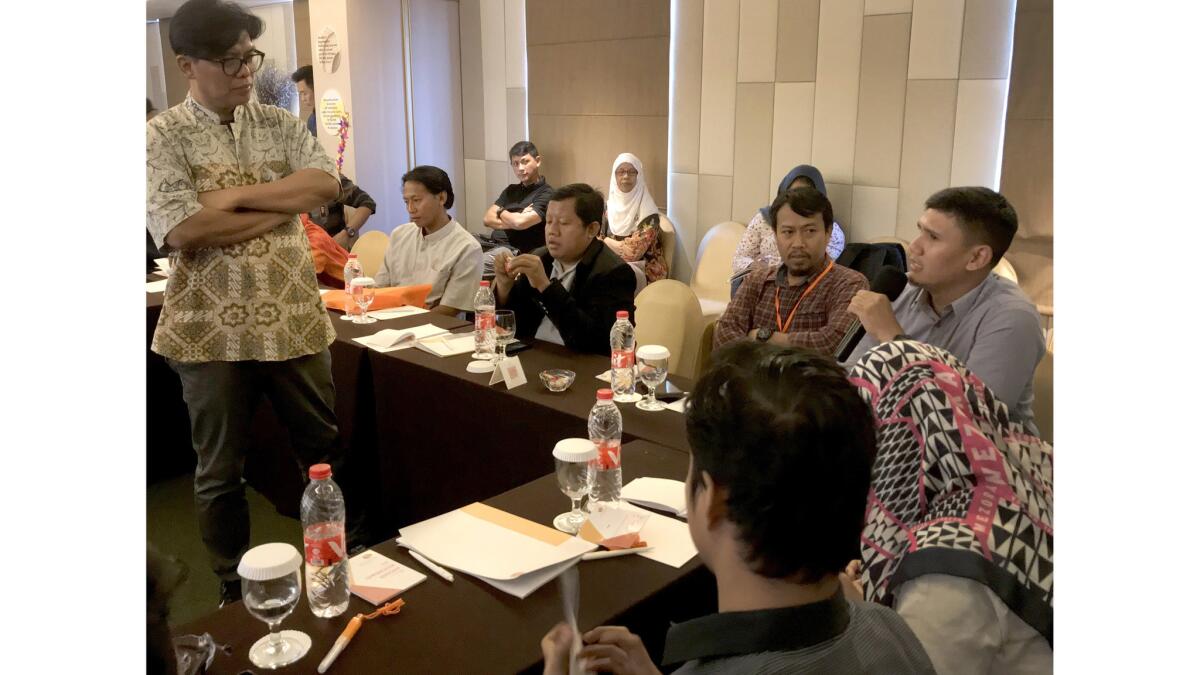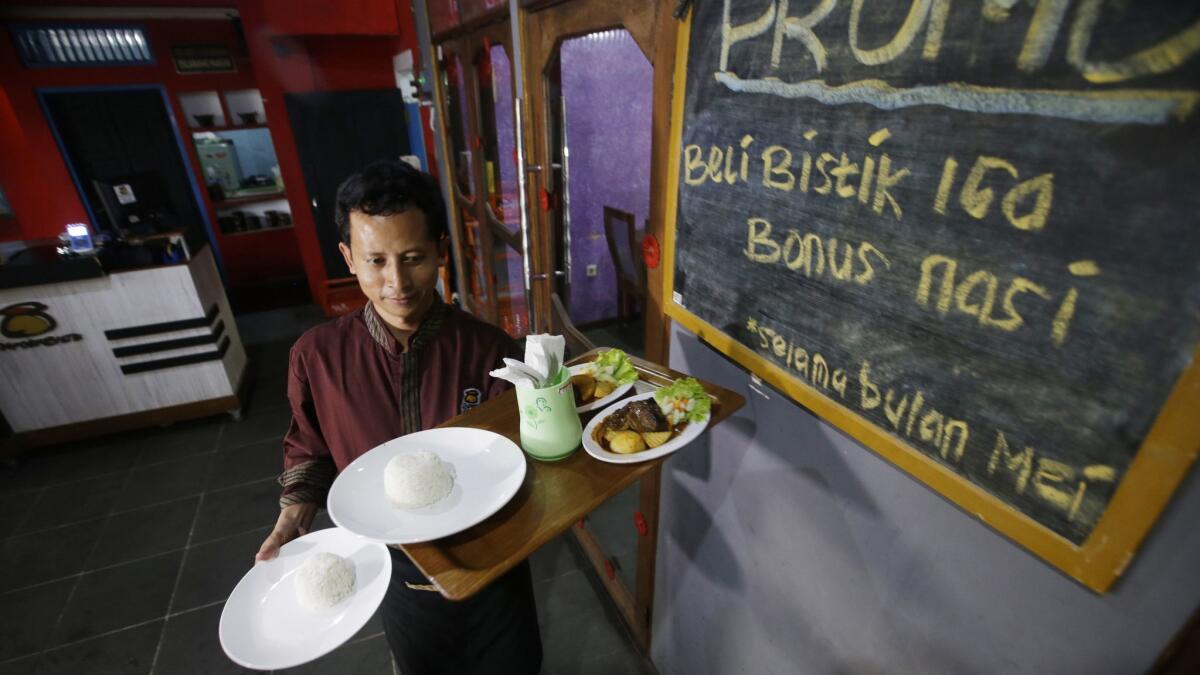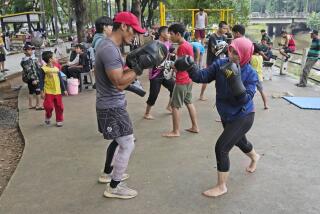‘We have four generations of former terrorists here today’: Rehabilitating extremists in Indonesia

Reporting from Jakarta — The Indonesian media has dubbed him “The Terrorist Whisperer.”
In a hotel conference room here, Noor Huda Ismail welcomed the participants in his three-day workshop. “We have four generations of former terrorists here today,” said the jovial 45-year-old as he bounded around the room in a batik shirt, black glasses and Nikes.
He gave a shout-out to the lone representative of the eldest generation, a graybeard who had joined the U.S.-backed mujahedin to fight the Soviets in Afghanistan in the 1980s.
With a smile and a nod, he acknowledged two former fighters from a Muslim group that sought to impose Islamic rule on the Philippines in the 1990s, then six veterans from Indonesia’s Muslim-Christian disputes a decade later.
“And the latest generation is here too,” he said, waving at a 19-year-old in a hijab who had gone to Syria with more than two dozen members of her family to join Islamic State.
The ex-jihadis — known in the counter-extremism world as “formers” — had come for help rebuilding their lives.
Ismail is dedicated to helping his country solve a problem confronting societies worldwide: how to de-radicalize violent extremists. His nonprofit takes a more compassionate approach than many other groups and governments, encouraging formers to share their stories and expand their social circles.
“The media always call me the terrorist whisperer,” he said. “But I would prefer they called me observer of the heart.”
The conference participants looked remarkably ordinary. They wore name tags, carried orange swag bags and passed around a microphone for questions. The venue — a marble-lobbied hotel here that caters to businessmen — seemed fitting. It was the kind of place that some of the attendees once might have aspired to blow up.
Having renounced their old ways, they now hoped to engage in peaceful pursuits such as starting small businesses or making autobiographical videos for YouTube — both topics at the conference last month.
“I hope using these skills won’t just help us make more money, but get blessings from God,” said 43-year-old Zaenal Muttaqin, who served 5½ years in prison for helping arm Indonesian terrorists and was now helping his wife with her tailoring business.
The formers bantered over coffee and cake and gathered for group selfies. Nobody lingered on their resumes in terrorism, which ranged from serving as low-level functionaries in jihadi networks to ordering beheadings.
A counter-extremism specialist from Facebook flew in from Singapore to talk about the company’s content-sharing policies, and a representative of TedxJakarta, a local affiliate of Ted, the New York-based nonprofit, led a workshop on storytelling.
In that session, the formers were paired up and instructed to tell each other the tale of Yusuf from the Koran — in which a young man rises to high office after his release from prison in Egypt — in five minutes or less. Then they were asked to boil down the story down to a slogan.
“Prison brings success!” someone called out to laughter and applause.
In addition to the 10 formers, the participants in the conference included 20 ustadhs, or teachers — university professors and Muslim scholars, split equally between men and women.
Formers and ustadhs were paired together in a sort of Secret Santa arrangement in which formers — dubbed “Angels” — would oblige their ustadhs — dubbed “Humans” — with uplifting texts or food deliveries from the restaurant buffet.
“Change can start from a very small act of kindness,” Ismail said.
The formers took careful notes as a public relations and digital branding executive shared tips on growing a brand online.
“There are a lot of similarities between terrorists and businessmen,” Ismail said. “Like businesspeople, terrorists are risk-takers, people persons, storytellers, and in their own way, are often charismatic.”

Ismail said he was once on a track toward extremism.
When he was 12, his parents, both civil servants in the Indonesian city of Solo, sent him to a hard-line Islamic boarding school there. He was hoping to study Islam in Pakistan, but when he asked the headmaster’s daughter out on a date, it marked him as “morally tainted” and cost him a scholarship.
He briefly belonged to Darul Islam, a group agitating for sharia law in Indonesia, but he loathed the infighting and quit.
In his late twenties, while working as a stringer for the Washington Post, he learned that one of the perpetrators of the 2002 Bali bombing — in which Islamic militants killed 202 people — was his boarding school roommate. Seeing police leaflets featuring his schoolmate’s face piqued his interest about paths into extremism. What, he wondered, would have made a bright young man want to murder innocents?
In 2008, after a stint at St. Andrews University in Scotland studying extremism, he started the Institute for International Peace Building — know by its Indonesian initials, YPP — and began recruiting former terrorists who were still in prison and wanted to start over. The organization helps them find jobs and new communities once they’re free.
“Most people thought I was crazy,” he said. “They were like, ‘why give a second chance to those who betrayed democracy in the first place?’ But we need to use their stories to dissuade others from following the same path.”
He said his early attempts at de-radicalization were failures. In one case, he funded an ex-con’s T-shirt business only to discover later that the former terrorist was printing T-shirts featuring jihadi slogans.
But eventually he found a former willing to truly reform. Machmudi Hariono had fought in the Philippines and served 5½ years in prison in Indonesia after police captured him in a safehouse for members of a terrorist group known as the Moro Islamic Liberation Front. Ismail taught him to cook duck, then helped him set up a restaurant. Serving customers proved a valuable cultural exchange and a lesson in tolerance.
“My jihadi networks taught me to hate people who are different from me,” Hariono said. “But through the restaurant, I learned to meet new people. Even if they’re nonbelievers, you have to serve them anyway.”
Hariono, 42, also works at the nonprofit, which now has 15 employees.

Governments around the world are grappling with how to handle people who joined extremist groups or expressed support for them. Now that Islamic State has lost the territory it once controlled in Iraq and Syria, many of its 40,000 foreign fighters have recently returned to their countries — including western Europe, Turkey and Tunisia.
The British defense minister, Gavin Williamson, has advocated for hunting down the returnees and killing them. “A dead terrorist can’t cause any harm to Britain,” he told the Daily Mail last year.
Other countries, including Pakistan and Germany, have launched de-radicalization programs. Many involve a mix of psychological counseling and religious debate.
But Ismail, who is writing a doctoral thesis on the role of masculinity in Indonesian terrorist networks, said such a paternalistic approach is likely to fail. Having clerics lecture jailed terrorists on interpretations of the Koran won’t work if the extremists assume the clerics are stooges of the state.
For many jihadis, Islamic ideology was never the point, he said: “Some of the terrorists are clueless about religion. They mainly get into it through who they’re hanging out with, or because they think the military aspects look cool.”
Indonesia, which has seen hundreds of its citizens join Islamic State, has been an ideal testing ground for Ismail’s belief that people can change.
As the world’s most populous Muslim country, it has a softer approach to combating terrorism and a more optimistic vision about the rehabilitation of formers than many Western countries, said Sidney Jones, director of the Jakarta-based Institute for Policy Analysis of Conflict.
“There was an assumption, especially in the pre-[Islamic State] years, that these were fundamentally good young men who’d gone astray,” said Jones. “That they’d joined these organizations out of a warped idealism, or the sense of wanting to help fellow Muslims being persecuted, and they just needed to be brought back to the right path.”
Though leaders of terrorist groups can receive long prison sentences, punishment for followers can be relatively light, even for murderers. In prison and after their release, former terrorists are encouraged to enroll in a government de-radicalization program or work with nonprofits such as Ismail’s.
Ismail declined to say who was funding the conference, only that they were “my friends.”
Several sessions were intended to challenge traditional views of women and foreigners. Alimatul Qibtiyah, a gender studies professor who’d done her graduate work in Iowa, shocked a few formers at the buffet lunch when she told them that she and her husband didn’t agree on whether wearing the veil was compulsory in Islam or not.
Other sessions were subtly tailored to appeal to jihadi sensibilities.
Hassan Ahmad, a humanitarian aid worker from Singapore, showed slides from his missions to Afghanistan, Yemen and Japan, stressing aid work’s excitement, danger and opportunity to help fellow Muslims — all common reasons for young men to join jihadi groups.
He paused at a slide of one colleague, killed in the Philippines in a typhoon.
“You can die doing this,” Ahmad said. “If you die, you want to die this kind of death. Praise God!”
After her presentation, the Facebook employee, Gullnaz Baig, took questions.
“Islamic State followers used to have many fake accounts, and then Facebook would take them down,” said one former. “If the account was taken down, people would just say, ‘My account has become shaheed [a martyr],’ and they’d just start another one. One dies, and a thousand grow. How does Facebook respond to this?”
The company traces, then deletes linked accounts it deems dangerous, Baig said.
There was also a workshop on parliamentary debate. Hasanuddin, who had recently spent 11 years in prison and like many Indonesians uses only one name, said he was more familiar with talk-show screaming and name-calling.
“On television, I notice that people don’t debate the way you’ve described,” he told the woman giving the talk.
“Maybe it’s because our society loves to bully,” Ismail said.
There was no mention of Hasanuddin’s crime: masterminding the beheading of three Christian schoolgirls.
After the conference ended, a small group of formers who had trained in the jungles of Southeast Asia accompanied Hariono to a friend’s high-rise apartment where they would spend the night before returning to their homes the next day.
“In the past, they would have seen an apartment as too luxurious, and as something for kafirs,” or infidels, Hariono said. “I want to broaden their view, and maybe they’ll share their story with other formers, and broaden their views, too.”
Power is a special correspondent.
More to Read
Sign up for Essential California
The most important California stories and recommendations in your inbox every morning.
You may occasionally receive promotional content from the Los Angeles Times.









